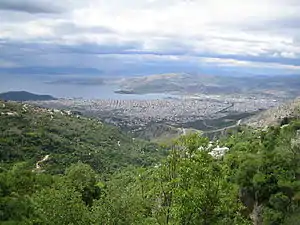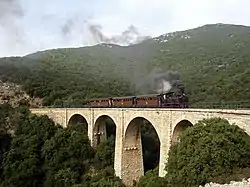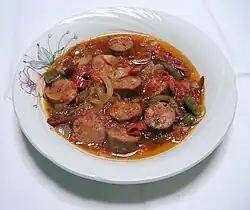Mount Pelion (a.k.a. Pelio or Pilio or Pelium; Greek, Modern: Πήλιο, Ancient/Katharevousa: Πήλιον) forms a hook-like peninsula between the Pagasetic Gulf and the Aegean Sea.
The mountains are entirely forested, with beech, oak, maple and chestnut trees. Pelion is a tourist attraction throughout the year: the mountain includes trails and sidewalks for walking within small and large beaches with sand or pebbles. Modern Pelio has twenty-four villages built with traditional Pelian architecture.
Regions
- Northeast Pelion, (Agios Ioannis, Horefto, Mouresi, Tsagkarada, Zagora)
- Northwest Pelion, (Afisos, Kato Gatzea, Agios Georgios Nileas, Portaria, Milies, Kala Nera)
- South Pelion, (Platanias, Xynovrissi, Paltsi, Milina, Argalasti, Horto, Trikeri, Agia Kyriaki, Paleo Trikeri)
Villages

The main villages in Pelion are:
Northwest Pelion
- 🌍 Portaria, Stagiates, Katichori.
- 🌍 Makrinitsa.
- 🌍 Milies, Vizitza, Pinakates.
- 🌍 Kala Nera, Kato Gatzea, Ano Gatzea.
- 🌍 Afissos, Afetes, Koropi.
- 🌍 Lefokastro.
- 🌍 Platanidia, Kato Lechonia, Ano Lechonia, Agios Minas.
- 🌍 Agios Vlasios, Agios Georgios Nilias, Paleokastro, Sernanates, Strofilos.
- 🌍 Chania, Drakia.
- 🌍 Agios Lavrentios.
Northeast Pelion
- 🌍 Zagora, Pouri, Chorefto, Agii Saranta, Makrirrachi, Omvrios.
- 🌍 Tsagkarada, Milopotamos, Fakistra.
- 🌍 Mouresi, Kissos, Anilio, Agios Ioannis, Papa Nero, Ntamouchari.
- 🌍 Neochori.
- 🌍 Kalamaki, Lampinou, Xourichti.
South Pelion
Understand
Many of the villages in Pelion trace their history to the beginning of the fifteenth century, when the entirety of Thessaly was under Ottoman rule. Many ethnic Greeks moved to Mount Pelion for security. Villages developed around monasteries, and their growth benefitted from privileges granted by the Ottoman authorities. The region of Pelion was self-administered, and the taxes payable by the villages were much lower compared to other parts of Greece. This contributed to the economic prosperity and extensive trade links of some villages. Schools were established with the fruits of local traders' prosperity and global experience. These schools would become pivotal in the role of the villages of Pelion in the Greek Enlightenment, which foreshadowed the 1821 Greek Revolution.
Get in
Entrance to the Pelion is broadly speaking via Volos, which acts as a gateway to the region. Volos is well connected to airports in Athens and Thessaloniki (as well as the far smaller municipal airport) and the wider Greek highway network. To enter the Pelion from Volos, one can either drive down the 34A or the 34 main roads, or take a coach from Volos Interurban Bus Terminal ("Yperastiko KTEL") (KTEL Volou). Details on buses, can be found online here.
Get around

Whilst it is possible to travel by coach, they are few and far between. The easiest option is to travel by car, unless you fancy a hike!
See
Makrinitsa, Portaria, Milies, Vizitsa, Tsagarada, Zagora are picturesque villages with traditional architecture: magnificent large old stone houses with wall decorations and slate roofs.
Do

- Walk along the recognized hiking routes.
- There are some great beaches on Pelion. Northwest Pelion has smaller sandy beaches on the Pagasetic Gulf, with calmer, warmer waters. Beaches in Northeast Pelion are also sandy with clear water and there can be big waves. The pick of the bunch is Potistika beach.
- Take the little train of Pelion, a traditional steam train from Kato Lechonia to Milies that slowly rolls through the lush Pelion terrain.
- Ski at Chania.
- Go horse riding around Milies
- Take a boat cruise from Kala Nera.
Beaches
- 🌍 Horefto. 2.5km long beautiful sandy beach
- 🌍 Agii Saranda. one of the most beautiful beaches in the area, partly managed with sunbeds
- 🌍 Agios Ioannis. touristy fully developed beach with many shops, taverns, cafes, hotels
- 🌍 Papa Nero. much visited beautiful sandy beach
- 🌍 Plaka
- 🌍 Damouchari
- 🌍 Fakistra
- 🌍 Mylopotamos
- 🌍 Limnionas
- 🌍 Potistika
- 🌍 Melani. beautiful long sandy beach, less touristy than the nearby Potistika beach. Best 'nudist' suitable beach on the Pelion
- 🌍 Mourtias. a bit out of the way, not so well-developed pebble beach
Buy
Eat

The most famous local dish, is called spetsofai (Greek: Σπετσοφάϊ), it has local sausage and peppers with tomato sauce. Usually spicy.
Drink
Sleep
Stay safe
- Drive cautiously and considerately. The roads in Pelion, most especially on the Aegean side, are often narrow and have a surprising number of hairpin turns and blind corners. Farmers will often park their pickups partly in the road at inconvenient spots. Pedestrians, including school children and the elderly, are frequently on the road at all times of year. Cyclists are becoming more common.
- Weather conditions should always be taken into account when driving, hiking or swimming. Thick fog can hamper driving conditions. Rain, even in summer, is not uncommon and can be torrential; roads do suffer from mudslides, most often in autumn and winter. In winter, heavy, sustained snowfall is common not only at the higher elevations but also in the villages; snow chains should be carried if you wish to use the part of the national road that crosses at Chania.